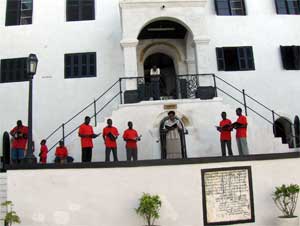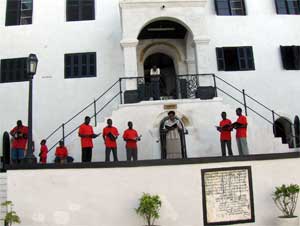 KINGSTON, R.I. — February 25, 2008 — When Vanessa Quainoo traveled to Ghana, West Africa, two years ago with her husband, Joseph and their three sons, she had no idea the lasting effect a one-day tourist excursion would have on her.
KINGSTON, R.I. — February 25, 2008 — When Vanessa Quainoo traveled to Ghana, West Africa, two years ago with her husband, Joseph and their three sons, she had no idea the lasting effect a one-day tourist excursion would have on her.
While Joseph, who was born in Enchi, Ghana, traveled there for his work as bishop of the New Covenant Church International, Quainoo had planned to use some of their time in Africa for her research on the communication patterns of indigenous women and African women in leadership positions and some time for tours with their children. One day, the family took a break and went to see the ancient castle of Elmina along the coast.
After visiting the castle, which is set in the town of Elmina on the shore of the Atlantic Ocean, the history of the landmark reshaped some of her personal and professional focus.
Quainoo, who has studied African American history and specializes in African American rhetoric, said she could hear the history and pain of oppression throughout the walls of the castle during her tour. After returning to her suburban home in Kingston, R.I., the director of the African and African American Studies program and communication studies professor, said she felt as though she had never left the castle, or the castle had never left her.
During her visit, she said she heard the calls not just of her children as they braced against the breeze outside of the castle, but inside walking the hallways, brushing her fingers against the prison bars, she heard sounds from the history of the place.
“I imagined and heard an entire story of two young people, a man and woman, who could not speak to one another because they did not share a common language and because the guards and structures in place would not permit them to speak. Yet, they had fallen in love and that love had inspired their hope and endurance.”
After the visit, she said she wrote feverishly to share the story. “I couldn’t stop writing and writing. It just poured out of me, as though I was the only one to bring a voice, to share the passion and the pain of the experience. The walls of Elmina were weeping.”
When she had finished, she had created a book-length poem she has called “Cry Elmina.” Written for performance in a readers’ theater format, the poem tells a story of two main characters, Kwame, a young male captive from a village south of Elmina, and Ama, a young woman from a village north of the town. They spot one another amid all of the chaos and form an immediate bond that grows, in spite of not being able to speak one another’s language or be together. Through the use of flashbacks, their individual histories are reconstructed, showing the reservoir from which they drew strength and courage.
Quainoo explained that Cry Elmina explores the socio-psychological stresses that likely would have been experienced by West African captives who were held in the castle-like structure before being sold into slavery and shipped across the Atlantic, to Europe and the West Indies. During the time of its use as a warehouse for captured Africans, the future slaves filled its sunless pits and crude dungeons.
By the late 18th century, over 11 million men, women and children had been taken from Africa to be used as slaves. The slave trade was then considered to be acceptable by all by a few countries.
This past spring, Quainoo was invited to present her poem at a conference held by the University of Cape Coast as part of the 50th year anniversary of Ghanian independence and rule over the castle. But her presentation did not take place at the university, it was held in the castle itself with five graduate students from the University of Cape Coast.
With a passion for sharing a vital piece of history, Quainoo brought her story to life for an audience of Elmina Castle curators, students and guests. With the student actors and even with participation of her sons, the audience saw, felt, and heard the sounds that Quainoo had sensed. It was a strikingly visual experience, with the black cast, against the starkly white castle.
“Those who had passed through this castle were people we don’t know anything about. They were not the classic, historic figures we may have read about. They were just the pawns caught by the powers, destined for slavery,” said Quainoo. “But these people were mothers having babies, they were children torn from their parents, kids who had been taken midstream from their ‘Mana,’ an African word that means Mother. It was all of this that had enveloped me.”
Keenly aware of American and African American history, Quainoo said historians, poets, and even filmmakers have reconstructed the transatlantic journey of the Africans, known as the Middle Passage. Yet, there has been little, if any, attention given to the lives of the captives before the Middle Passage. Her poetic work is an exploration of this sad but rich history.
Quainoo said the experience at Elmina shifted and strengthened her professional focus. “As an African American scholar and teacher, I had often felt a need to apologize for privileging the oral-based focus of my rhetorical research. My experience with Cry Elmina has changed that. It has been a liberating affirmation of oral-based cultural history and communication. The process allowed me to merge my academic and creative expertise for the purpose of telling the story and contributing to the African American narrative.”
“So much of this history is untold. While I know this is fiction, it is rooted in the facts of the past that are not really discussed or described in American history books. This is the root of the African American experience. It is from Elmina that so many of our forbearers became enslaved and were shipped to the Americas and other countries. This history is fundamental to all of our cultures,” she said. “While Elmina represents the suffering of African slaves, it is a symbol for all oppression and suffering.”
Excerpt from Cry Elmina
From Movement IV
Cry Elmina
We will cry
Cry Elmina
We will cry
Shout Elmina
We will shout
Shout Elmina
We will shout
Sing Elmina
How can we sing?
In a strange land
How can we sing?
Sing the Lord’s song
Yes, we will sing.
Kwame sat against the wall
Lizards ran along the stone border
Chasing away dreams
Pausing and suspending hopes
For tomorrow
It was the time of the evening he imagined
Right before sunset
The soldiers ate
His brothers languished in the No light of a captive’s afternoon
He moved quietly to the gated doorway.
At precisely this hour Ama was sure to walk by
As he women were moved to their sleeping dungeon.
Ama had made it a point to walk as close to the wall as possible
Seeing Kwame was her delight.
Slowly she turned her head toward his quarters
Not to alarm the soldier
Softly, she let her arm and hand brush against the gate
For seconds, their eyes locked
Ama’s soul smiled
Kwame’s danced
He followed her with his eyes until she disappeared
Then, with ritual grace,
Reached his hands to caress the place where she had laid hers
Silence consoled his ache
Silent weeping, hers.
Both drifted along the river of sleep
The sounds of labored breathing all around.

